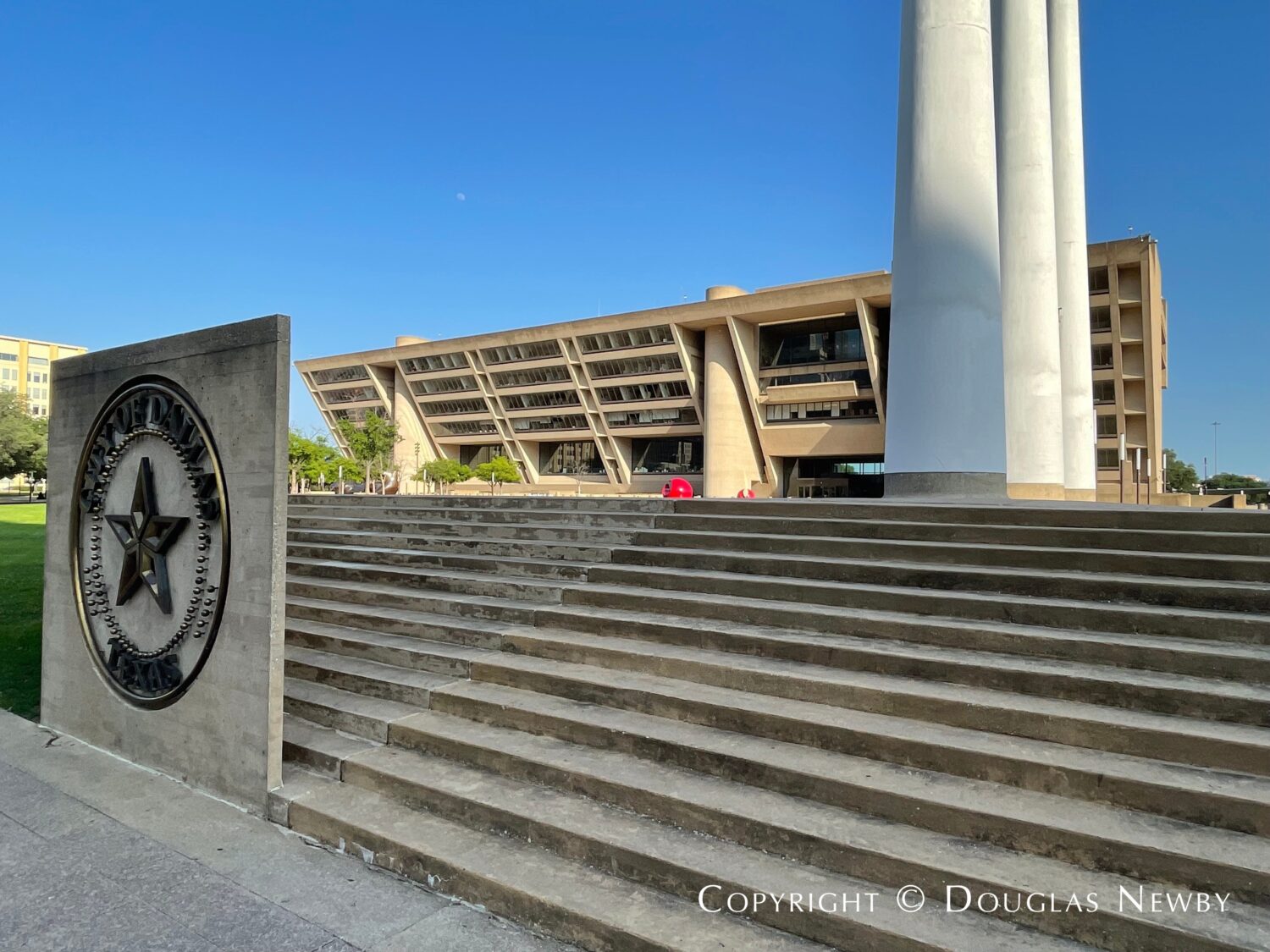
The City Manager form of government always seemed to give Dallas an advantage. It seemed to prevent a Chicago Mayor style form of ward system government, creating a political machine ripe for corruption. Now Dallas has something even worse than a Chicago Mayor ward system form of government. Dallas has a City Manager ward system form of government.
Chicago Can Vote Out Mayor
Chicago citizens can at least vote out a mayor for corruption or inefficiency. Dallas voters do not have the luxury to vote out a City Manager for incompetency or inefficiency. Why does this matter now, if Dallas has had a City Manager form of government since 1931 and given that the Mayor and City Council set the policy? It matters now because instead of original at-large City Council districts, Dallas has in effect a ward system of representation with its 14 single member districts. It also matters now because the City Manager proposes the budget, spends the money, and even hires the Chief of Police, in effect dictating policy.
Dallas City Manager Cannot be Fired by City Council Majority
But can’t the majority of the City Council remove the City Manager if he does a bad job or is not responsive? No, the majority of the City Council cannot remove the City Manager. It takes a super majority of the City Council to remove a City Manager if he does a bad job or is not responsive. This means the City Manager only needs the support of six City Council persons to retain his $436,000/year job. The combination of the City Manager setting the budget and spending the money, and the almost total control that the City Councilpersons have over their respective districts, can breed an unholy alliance between six compliant City Councilpersons and the City Manager. For instance, if hypothetically a developer seeks a favor from a City Councilperson to get permission to build a low-income tax credit or subsidized apartment development, the Councilperson can seek a favor from the City Manager to approve this development in return for protecting the City Manager’s job. Out of the 15 members on the City Council, the City Manager only needs to keep six of them happy and he is untouchable regardless of how well or how poorly he is doing his job.
Dallas City Manager Has Too Much Control Over Low-Income Housing
I give low-income housing as an example of potential trouble, because that is the area that has landed the greatest number of Dallas City Councilpersons in prison over the last two decades. It is also currently the most contentious issue in southern Dallas. Citizens of City Council District 3, which is made up predominately of minority residents, have filed a formal complaint to HUD claiming harm to southern Dallas homeowners, due to the many instances when the City of Dallas dumped low and mixed-income apartments into their neighborhoods. The Dallas Mayor and the City Councilpersons outside of southern Dallas have little or no say in this ongoing proliferation of subsidized new low and mixed-income apartment developments in southern Dallas, because each district is controlled by its City Councilperson and the City Manager.
Single Member Districts Segregate Dallas and Create Ward System Under City Manager Form of Government
The old and now tired argument is that single member districts give a greater voice to minority voters. This is not true. In 1990, on the eve of a Dallas referendum on the 14-1 single member district plan (one at-large elected mayor), I wrote an op-ed, 14-1 Plan Resegregates Dallas, opposing the 14-1 plan because it would resegregate the city. It appeared across from the Mayor’s op-ed in favor of 14-1. The 14-1 referendum failed, but the City Council proceeded to carve out beneficial districts for themselves and implemented the plan anyway.
At-Large City Council Districts Give Voters More Opportunity to Vote for a Minority
However, my op-ed arguments from 30 years ago proved true. At-large districts gave more voters an opportunity to vote for a minority candidate for office, and white voters were open and eager to do so. In fact, two of Dallas’ at-large elected mayors have been black. While white City Councilpersons have been elected in minority districts, a minority has never been elected to a majority white district. The more anticipated problem of single member districts creating a ward system also proved true. Almost immediately, City Councilpersons approached about an issue not in their district would decline to get involved. They cited City Council courtesy that is extended on almost every zoning or other issue pertaining to a specific district. No City Councilperson could effectively pursue the best interest of the entire city. Their job was to solely represent their district. When the City Manager proposes the budget and controls the spending, the City Manager in effect controls the city policy with the complicity of six City Councilpersons. This leaves our mayor, the only at-large elected official, who has very little influence or control, representing the interest of the entire city. No wonder several of our past mayors have advocated changing the Dallas Charter to abandon a City Manager form of government and replacing it with a mayor form of government.
Why City Manager Form of Government is No Longer Effective
In the past, I’ve been very much in favor of the City Manager form of government, but my thinking has changed for two reasons. First, I consider our current mayor, Eric Johnson, a brilliant and insightful mayor generally interested in benefitting every citizen of Dallas. Dallas also has been fortunate of having a long line of very capable mayors. Mayor Eric Johnson, in refreshing contrast to the mayors of other cities across the country, has been a strong advocate of increasing the budget for funding the police, lowering the tax rate, eliminating burdensome delays in the building permit process, creating a pathway for better jobs for low-income workers, and promoting homeownership that creates generational wealth for minorities, rather than artificially integrating white neighborhoods with subsidized apartments. I am frustrated that the mayor cannot do more to push these ideas further forward.
City Manager in Ward System Can Ignore Mayor
The second reason for my change in thinking about a City Manager form of government is the public attitude of the current City Manager T.C. Broadnax. Having a City Manager’s graduate degree myself – a Master’s in Public Administration – I was taught by professors and also adjunct professors who were Assistant City Managers and studied alongside future City Managers. A City Manager is a position I greatly respect. In the past, the Dallas City Manager, regardless of the amount of power he or she wielded, publicly was very respectful of the Dallas Mayor. When we still had some at-large members of the City Council, the legendary Mayor Robert Folsom and City Manager George Shrader worked together to create fantastic projects for Dallas including Bryan Place, the first inner-city single-family home development in decades. Mayor Ron Kirk and City Manager Mary Suhm also come to mind.
City Manager is Hindering Progress on Dallas Priorities
Currently, the Dallas City Manager appears to be hindering progress on the priorities of the mayor. Some mayoral priorities have been sidelined; others have been dismissed. The Dallas City Manager has been widely reported to be displeased that there was any objection to how the Dallas building permit process has been handled. In remarks to business and civic groups, the City Manager has openly ridiculed the Dallas mayor for his high profile and his prolific emails and tweets – in which the mayor informed the public on issues facing Dallas and steps being taken. It is hard to recall a high-profile employee of any organization who has been so blatantly dismissive of their boss as the Broadnax has been of Mayor Johnson. Even though the City Manager makes four times as high a salary as the mayor, technically the mayor is still the City Manager’s boss. In reality, in our current form of City Manager ward system form of government, the City Manager does not have a boss, just an alliance with six City Councilmembers that protect his position.
Dallas Needs to Make Two Changes to City Charter to Reform City Manager Form of Government
Dallas urgently needs to make two changes to its City Charter to maintain its position as the most successful city in the nation. 1) Reconfigure the City Council so that at least a few of the City Council positions are elected at-large, to give Dallas citizens the opportunity to be represented by more than one person controlling a City Council District fiefdom. 2) Change the City Manager form of government to a mayoral form of government, or at least allow the Mayor to propose the budget and hire the Chief of Police.
Changes in City Charter Will Vault Dallas to Greater Success
With some City Council members elected at-large, and the Mayor having more direct influence, the Mayor’s policies embraced by Dallas could be implemented, vaulting Dallas to further success as a city.


